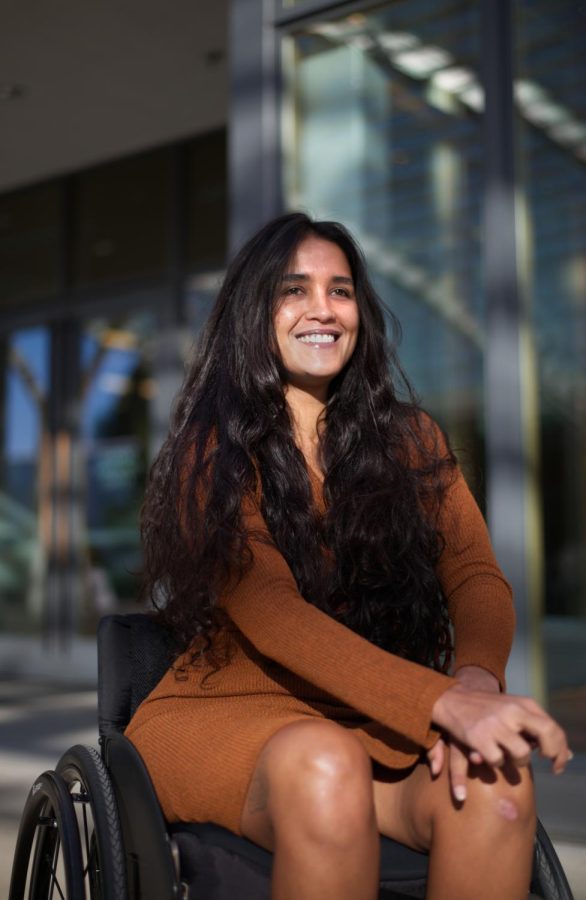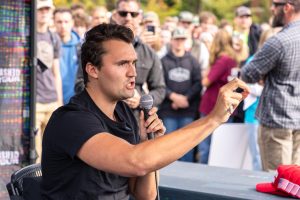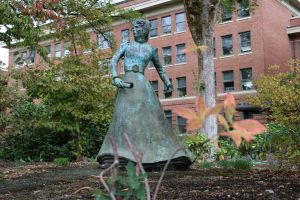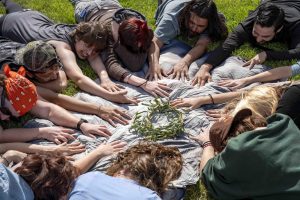ASOSU to run a pilot program for a disabled student lounge
Cameo Perrells (She/Her) is the president of the Disabled Student’s Union. She is an interior design major that is hoping to make the world a more accessible place for everyone. Cameo and her fellow club members are advocating for the creation of a Diabled student cultural center, but have been told they may only be allowed a temporary student lounge.
November 3, 2022
Across the country, 11 colleges and universities already have disability cultural centers, with the closest one to Oregon State University being at the University of Washington in Seattle. However, this will soon change.
Last May, the Associated Students of Oregon State University announced they began working towards establishing a pilot program for a disability cultural center, after allocating funds for it during their fee setting process back in winter term 2022.
According to ASOSU President Matteo Paola, $62,000 was allocated towards the disabled student lounge in addition to establishing an international student lounge. The funds will be directed towards student workers to staff the centers, programming, events and sectional space.
Last year, MU 115 in the Memorial Union was offered as a potential room to host the disabled student lounge, however the MU is not easily accessible due to the multiple floors according to DSU President Cameo Perrells.
“It’s extremely inaccessible and inconvenient,” Perrells said. “For people like myself, who use wheelchairs, members of our club who have sensory processing and for members who are visually impaired.”
Additionally, that room would have been shared with the international student lounge.
“I don’t think that’s reasonable for any of the groups to have to share space and then kind of draw a line in the middle and say, ‘This is yours, this is ours.’ And for someone like me, using a wheelchair, people aren’t familiar with my access needs and it’s not my job to teach anybody other than the people that I involve myself with every day,” Perrels said. “If it was shared with other people, it would get uncomfortable and it’s a space where I should relax and not have to educate anyone who comes by.”
As it stands right now, ASOSU is still in the process of finding a space to host the disabled student lounge.
“We’re just gonna be doing the research and programming and events that we can without a dedicated space,” Paola said. “So we’ll just be like reserving spaces in the MU or Student Experience Center, on an as-needed basis as we do events. I think it’s pretty unlikely that we’re gonna get a space this year for that.”
ASOSU’s decision to go forth with establishing the pilot program stems from years of advocacy work from students, especially within the last two or three years after the founding of the Disabled Students Union, an on-campus club aimed at supporting and creating community for disabled students at OSU, according to Kathleen Bogart, director of the Disability and Social Interaction Lab at OSU.
While OSU does have Disability Access Services, DAS focuses on academic accommodations. According to DAS Director Martha Smith, DAS is not a resource center and is not funded to support students in the ways a resource or cultural center would be able to.
This leaves many students lacking the support they need.
In the proposal for a disability cultural center, ASOSU cited that more than 10% of college students have some sort of disability but only one-third will graduate within eight years of enrollment due to a lack of support.
“I think people might think that we don’t need a lounge or cultural center because we have the DAS, but that’s for academics,” Perrells said. “That’s not for social or community.”
A place centered around fostering community is more capable of providing the additional support an academic service such as DAS is unable to provide.
“This is a really powerful burgeoning movement where people are starting to recognize that there’s strength in this community and we have pride in this community and this identity,” Bogart said.
Even though the disabled student lounge is currently a pilot program, there are plans to make it permanent in the future.
Currently, ASOSU will be conducting research and needs assessments to see “what it is they’re looking for, like what encourages people to show up and what people would like to see out of their space,” Paola said.
This data will help in establishing a permanent cultural or resource center for disabled students.
“To have a strong cultural center, you need your own permanent space, right,” Bogart said. “You need to know that your community has a comfortable place to go that’s their own, that won’t be taken away—that they can go and find others like them and maybe find resources.”






